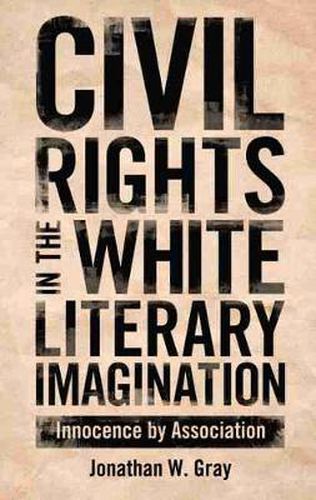Readings Newsletter
Become a Readings Member to make your shopping experience even easier.
Sign in or sign up for free!
You’re not far away from qualifying for FREE standard shipping within Australia
You’ve qualified for FREE standard shipping within Australia
The cart is loading…






This title is printed to order. This book may have been self-published. If so, we cannot guarantee the quality of the content. In the main most books will have gone through the editing process however some may not. We therefore suggest that you be aware of this before ordering this book. If in doubt check either the author or publisher’s details as we are unable to accept any returns unless they are faulty. Please contact us if you have any questions.
The statement,
The civil rights movement changed America,
though true, has become something of a cliche. Civil Rights in the White Literary Imagination seeks to determine how, exactly, the movement affected four iconic American writers: Robert Penn Warren, Norman Mailer, Eudora Welty, and William Styron. Each of these writers published significant works before and after the Brown v. Board of Education case in 1954 and the Montgomery Bus Boycott that began in December of the following year, making it possible to trace their evolution in reaction to these events. The work these writers crafted in response to the upheaval of the day, from Warren’s Who Speaks for the Negro?, to Mailer’s
The White Negro
to Welty’s
Where Is the Voice Coming From?
to Styron’s Confessions of Nat Turner, reveal much about their own feeling in the moment even as they contribute to the national conversation that centered on race and democracy.
By examining these works closely, Gray posits the argument that these writers significantly shaped discourse on civil rights as the movement was occurring but did so in ways that–intentionally or not–often relied upon a notion of the relative innocence of the South with regard to racial affairs and on a construct of African Americans as politically and/or culturally naive. As these writers grappled with race and the myth of southern nobility, their work developed in ways that were simultaneously sympathetic of, and condescending to, black intellectual thought occurring at the same time.
$9.00 standard shipping within Australia
FREE standard shipping within Australia for orders over $100.00
Express & International shipping calculated at checkout
This title is printed to order. This book may have been self-published. If so, we cannot guarantee the quality of the content. In the main most books will have gone through the editing process however some may not. We therefore suggest that you be aware of this before ordering this book. If in doubt check either the author or publisher’s details as we are unable to accept any returns unless they are faulty. Please contact us if you have any questions.
The statement,
The civil rights movement changed America,
though true, has become something of a cliche. Civil Rights in the White Literary Imagination seeks to determine how, exactly, the movement affected four iconic American writers: Robert Penn Warren, Norman Mailer, Eudora Welty, and William Styron. Each of these writers published significant works before and after the Brown v. Board of Education case in 1954 and the Montgomery Bus Boycott that began in December of the following year, making it possible to trace their evolution in reaction to these events. The work these writers crafted in response to the upheaval of the day, from Warren’s Who Speaks for the Negro?, to Mailer’s
The White Negro
to Welty’s
Where Is the Voice Coming From?
to Styron’s Confessions of Nat Turner, reveal much about their own feeling in the moment even as they contribute to the national conversation that centered on race and democracy.
By examining these works closely, Gray posits the argument that these writers significantly shaped discourse on civil rights as the movement was occurring but did so in ways that–intentionally or not–often relied upon a notion of the relative innocence of the South with regard to racial affairs and on a construct of African Americans as politically and/or culturally naive. As these writers grappled with race and the myth of southern nobility, their work developed in ways that were simultaneously sympathetic of, and condescending to, black intellectual thought occurring at the same time.